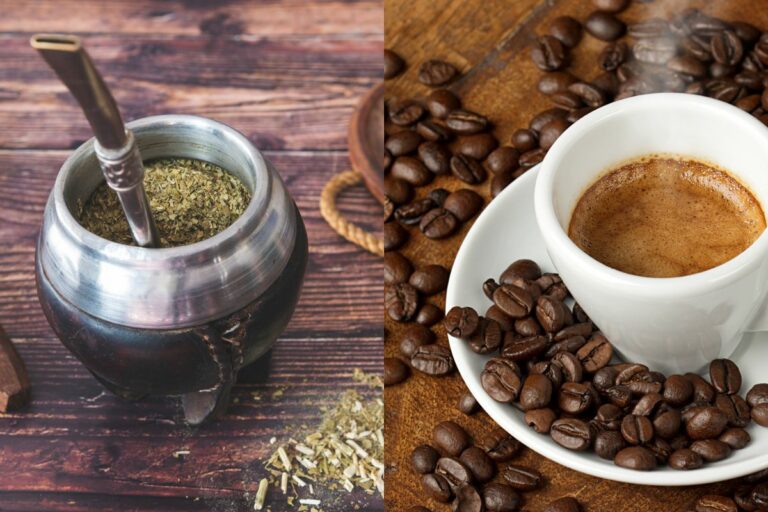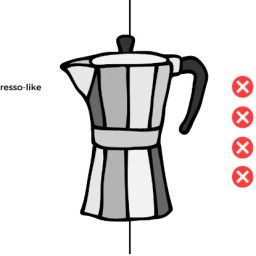
Yerba mate and coffee are two of the world’s most beloved beverages, each with deep cultural roots and a loyal following. In recent years, yerba mate has been gaining global popularity, not just in its native South America but across the world.
Key Takeaways
- Yerba Mate’s Gentle Caffeine Kick: Unlike coffee, yerba mate is known for delivering a smoother, more balanced energy boost. Many people find that it doesn’t cause the jitteriness or crashes often associated with coffee. This makes yerba mate a preferred choice for those sensitive to the more intense effects of coffee’s caffeine.
- Health Benefits of Both Beverages: Both yerba mate and coffee are packed with antioxidants, though their profiles differ slightly. Yerba mate boasts a unique blend of vitamins and minerals, providing almost all the micronutrients needed to sustain life. This includes vitamins A, C, E, B1, B2, B3, B5, and B6, along with minerals like calcium, manganese, iron, selenium, potassium, magnesium, phosphorus, and zinc.
- A Matter of Taste and Preference: Ultimately, whether yerba mate or coffee is better may come down to personal preference. Some may prefer the earthy, herbal flavor of yerba mate, while others may opt for the rich, robust taste of coffee. Additionally, the choice might hinge on how each beverage makes you feel physically and mentally throughout the day.
Caffeine Content and Health Impacts
When it comes to caffeine content, both yerba mate and coffee pack a punch, but there are notable differences. Typically, an 8-ounce serving of coffee contains between 80 to 100 milligrams of caffeine, whereas the same amount of yerba mate has about 30 to 50 milligrams. This means that yerba mate generally offers a milder caffeine experience compared to coffee.
Health Implications of Caffeine
Caffeine is well-known for its ability to enhance alertness and concentration. However, it can also lead to side effects like insomnia, nervousness, restlessness, and in some cases, an increased heart rate and blood pressure. Because coffee has a higher caffeine content, these effects can be more pronounced compared to yerba mate.
The Role of Theobromine and Theophylline
Yerba mate contains two other stimulants, theobromine and theophylline, which work together with caffeine to provide unique health benefits. Theobromine, also found in chocolate, has a milder stimulant effect than caffeine and is known for its mood-enhancing properties. It can help to promote a sense of well-being and relaxation.
Theophylline, on the other hand, is a compound similar to caffeine, known for its ability to help ease breathing and improve airway function, making it beneficial for those with respiratory issues.
Different Effects on the Body
These compounds in yerba mate contribute to a less intense, but longer-lasting energy boost compared to the quick jolt that coffee often provides. This combination means that yerba mate can increase alertness without the harsher side effects like jitteriness or the potential for a caffeine crash that coffee might cause.
This makes yerba mate a preferred option for those looking for sustained energy support without disruptive side effects.
Vitamins and Minerals in Yerba Mate
Yerba mate stands out for its rich content of vitamins and minerals. It’s not just a source of caffeine; it’s a nutritional powerhouse. Yerba mate contains vitamins A, C, E, B1, B2, B3, B5, and B6. Each of these plays a vital role in overall health, from boosting the immune system to enhancing skin health and energy metabolism.
When it comes to minerals, yerba mate provides a generous amount of potassium, magnesium, and manganese—essential nutrients that support heart health, bone strength, and blood sugar regulation.
Antioxidants in Yerba Mate
Beyond its vitamins and minerals, yerba mate is loaded with antioxidants, which are crucial for fighting free radicals in the body, reducing oxidative stress, and potentially lowering the risk of chronic diseases. Yerba mate contains polyphenols, flavonoids, and saponins, which have anti-inflammatory and cholesterol-lowering properties. This rich blend of antioxidants can support better health and protect against various diseases.
Comparison with Coffee
Coffee, while best known for its high caffeine content, also offers significant antioxidant benefits. It is particularly rich in hydroxycinnamic acids and chlorogenic acids, powerful antioxidants that help reduce inflammation and may protect against conditions like heart disease and diabetes. Coffee’s antioxidants are effective in neutralizing harmful free radicals, thus supporting overall health.
Balancing Benefits
Both yerba mate and coffee provide unique nutritional benefits. While coffee may be a go-to for a quick energy boost due to its higher caffeine content, yerba mate offers a broader spectrum of vitamins and minerals, making it a more balanced choice for those seeking both stimulation and substantial nutritional benefits.
Whether you choose yerba mate or coffee may depend on what you’re looking for in a beverage—immediate alertness from coffee or a nutrient-rich, gentler boost from yerba mate.
Cultural Significance and Availability
Yerba mate holds a special place in South American culture, particularly in countries like Argentina, Uruguay, Paraguay, and southern Brazil. It’s more than just a beverage; it’s a social ritual, deeply embedded in the daily lives of these communities.
Traditionally, yerba mate is consumed from a shared gourd (mate) and sipped through a metal straw (bombilla), which fosters a sense of community and belonging. This communal aspect of yerba mate drinking highlights its role in social gatherings and its cultural importance as a symbol of hospitality and friendship.
Global Presence of Coffee
Coffee, on the other hand, has a widespread global presence and is integral to various cultures around the world. From the espresso bars of Italy to the bustling coffee shops of the United States, coffee has become a key part of social interactions and personal routines across the globe. Its versatility and the variety of ways it can be prepared and enjoyed contribute to its enduring popularity.
Availability
Both yerba mate and coffee are widely available, but their prevalence varies by region. Yerba mate is readily available in South America and is gaining popularity in North America and Europe through specialty stores and online markets. Coffee is ubiquitous and can be found almost everywhere, from local supermarkets to gourmet coffee shops worldwide.
Preparation and Consumption Practices
The traditional preparation of yerba mate involves filling a gourd with dried leaves and adding hot water. The drink is then enjoyed through a bombilla. This method allows for the extraction of flavors and nutrients over several refills, with each pour slightly different in taste.
Coffee Brewing Methods
Coffee can be prepared in numerous ways, each bringing out different flavors and strengths. Popular methods include drip brewing, French press, espresso, and cold brew. The choice of method often depends on personal preference for strength, acidity, and texture of the coffee.
Influence on Preference and Perceived Benefits
The preparation of yerba mate and coffee not only affects their taste but also influences the perceived benefits and the consumer’s experience. For example, the slow and communal nature of drinking yerba mate may enhance the perceived relaxing effects, while the quick and potent delivery of caffeine from an espresso might be seen as a more effective wake-up call.
Ultimately, the method of preparation can deeply affect why and how people choose between yerba mate and coffee, reflecting personal tastes and cultural backgrounds.
FAQs
Can Yerba Mate Replace Coffee as a Morning Drink?
Absolutely! Yerba mate can be a great alternative to coffee as a morning beverage. It offers a gentler, more sustained energy boost without the often-associated crash of coffee’s higher caffeine levels. For those sensitive to the strong effects of coffee or looking for a beverage with a rich nutritional profile, yerba mate is an excellent choice.
What Are the Long-term Health Effects of Both Beverages?
Both yerba mate and coffee have been studied for their long-term health effects, and both offer benefits when consumed in moderation. Regular consumption of yerba mate can provide antioxidant benefits, aid digestion, and support cardiovascular health. Coffee, known for its high antioxidant content, may reduce the risk of several diseases, including Parkinson’s, Alzheimer’s, and certain types of cancer. However, excessive consumption of either can lead to negative effects, such as increased heart rate or gastrointestinal issues.
How Do the Costs of Yerba Mate and Coffee Compare?
The cost of yerba mate and coffee can vary widely depending on the brand, quality, and region. Generally, coffee might be more expensive per serving, especially when purchasing specialty blends or beans compared to standard yerba mate. However, prices for premium yerba mate products can also be comparable to high-end coffee products.
Final Thoughts
The choice between yerba mate and coffee often boils down to personal preference and lifestyle needs. Whether you prefer the smooth, sustaining lift of yerba mate or the quick, robust energy boost from coffee, both beverages offer unique flavors, cultural significance, and health benefits.









